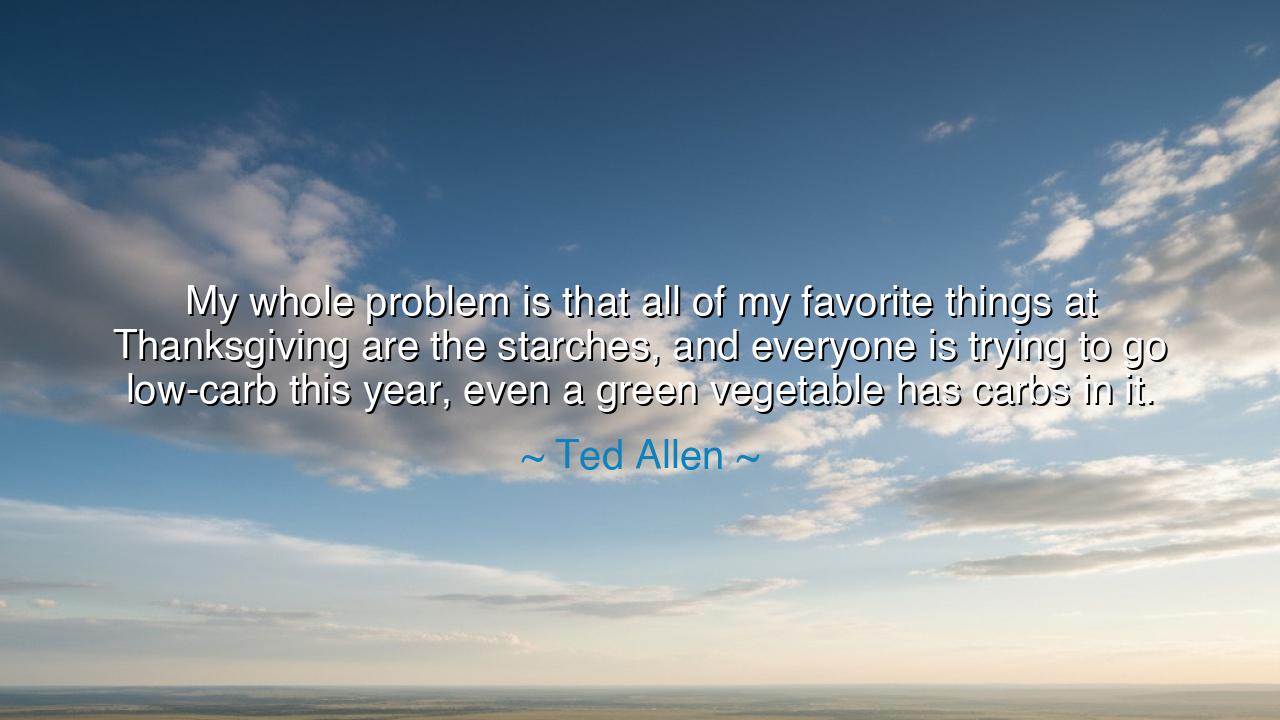
My whole problem is that all of my favorite things at
My whole problem is that all of my favorite things at Thanksgiving are the starches, and everyone is trying to go low-carb this year, even a green vegetable has carbs in it.






Ted Allen, with his wit and sharp eye for the table, once declared: “My whole problem is that all of my favorite things at Thanksgiving are the starches, and everyone is trying to go low-carb this year, even a green vegetable has carbs in it.” At first, these words seem playful, but beneath them lies a deeper reflection on the tension between tradition and modern discipline, between the joy of feasting and the restraints of health-conscious living. For Thanksgiving has long been a holiday of abundance, a time when the table groans with starches—potatoes, bread, stuffing, pies—symbols of comfort and satisfaction. Yet the modern age, obsessed with diets and restrictions, threatens to rob the feast of its ancient fullness.
The origin of Allen’s lament lies in the evolution of Thanksgiving itself. In its earliest form, it was not about restraint but about survival and gratitude. The Pilgrims and the Wampanoag did not count calories; they gave thanks for whatever could be harvested and prepared. Bread, corn, and root vegetables were sacred gifts of the earth, celebrated without shame. Over the centuries, these humble starches became central to the American table, embodying the warmth of family, the satisfaction of work, and the abundance of the land. To Allen, the thought of losing them is to lose the very soul of the feast.
History gives us many examples where abundance was celebrated without hesitation. In ancient Rome, the great banquets of emperors were filled with breads, grains, and fruits—symbols of prosperity and empire. In medieval Europe, harvest festivals overflowed with baked goods and roasted roots, staples that nourished entire villages. These carbohydrate-rich foods were not seen as enemies, but as lifelines, essential to survival and deeply tied to the rhythm of the earth. To reject them, as Allen notes with humor, is almost to betray the spirit of the feast itself.
The deeper meaning of his words is that joy should not be lost in the pursuit of perfection. When we allow diets, restrictions, and anxieties to dominate even our moments of celebration, we risk losing the very heart of the holiday. Thanksgiving is not about calculating intake, but about remembering abundance and giving thanks. To eat a spoonful of mashed potatoes or a slice of bread is not simply to consume—it is to participate in centuries of tradition, to honor the gifts of the harvest, and to share in the simple joy of plenty.
Yet there is also wisdom in recognizing balance. Allen’s words remind us of the clash between tradition and modernity. While our ancestors ate to survive, we live in an age of excess, where too much abundance can harm. Thus, the struggle of the low-carb table is a reflection of our times: the desire to honor tradition, yet also to preserve health. The challenge, then, is not to abandon the starches entirely, but to approach them with gratitude and moderation, remembering that they are gifts to be savored, not burdens to be feared.
The lesson for future generations is this: when you gather for Thanksgiving, do not let fear or fashion rob you of the joy of the table. Embrace the traditions of your family, the dishes that carry memories, the foods that warm the heart. Do not despise the bread and the potatoes, for they have sustained countless lives before yours. At the same time, learn balance, so that your body is cared for as well as your spirit. Let the feast be a celebration, not a contest of restraint.
Practical wisdom flows from this truth. At your table, serve the starches with pride, but let them be accompanied by vegetables, fruits, and proteins, so that abundance is shared without excess. Allow laughter and storytelling to be the main course, with food as its companion. And when you look at your plate, see not only calories or restrictions, but the heritage of generations, the bounty of the earth, and the love of those who cooked for you.
Thus, Ted Allen’s humorous lament becomes a parable of balance. Thanksgiving is a holiday of gratitude, and gratitude is never small, never mean-spirited, never withholding. To eat the starches with joy is to honor the tradition of abundance, to remember the earth’s generosity, and to affirm that the feast is not merely about the food on the plate, but about the spirit with which it is shared.






AAdministratorAdministrator
Welcome, honored guests. Please leave a comment, we will respond soon